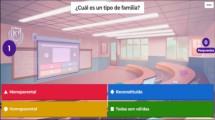Abstract
Gamification in educational context has been the subject of many studies in the last few years. There are studies for primary, secondary and higher education, which evaluate the effect of gamification on learning, motivation, engagement, concentration and enjoyment. Although vocational training is very important for training professionals, a few researches study gamification as a learning method in this type of education. Students in vocational training classes are most heterogeneous due to the difference in age among the students and their previous training. This paper focuses on how gamification affects the motivation and learning in a group of students of vocational training. Our results indicate that students using gamification as a means of learning improved slightly more than the rest. Most students enjoyed the gamified experience and they showed a great interest in continuing using this methodology.
Access this chapter
Tax calculation will be finalised at checkout
Purchases are for personal use only
Similar content being viewed by others
References
Stetina, B.U., Kothgassner, O.D., Lehenbauer, M., Kryspin-Exner, I.: Beyond the fascination of online-games: probing addictive behavior and depression in the world of online-gaming. Comput. Hum. Behav. 27, 473–479 (2011)
Hamari, J.: Transforming homo economicus into homo ludens: a field experiment on gamification in a utilitarian peer-to-peer trading service. Electron. Commer. Res. Appl. 12(4), 236–245 (2013)
González, C.S., Gómez, N., Navarro, V., Cairós, M., Quirce, C., Toledo, P., Marrero-Gordillo, N.: Learning healthy lifestyles through active videogames, motor games and the gamification of educational activities. Comput. Hum. Behav. 55, 529–551 (2016)
Hanus, M.D., Fox, J.: Assessing the effects of gamification in the classroom: a longitudinal study on intrinsic motivation, social comparison, satisfaction, effort, and academic performance. Comput. Edu. 80, 152–161 (2015)
Jang, J., Park, J.J.Y., Yi, M.Y.: Gamification of online learning. In: Conati, C., Heffernan, N., Mitrovic, A., Verdejo, M.F. (eds.) AIED 2015. LNCS (LNAI), vol. 9112, pp. 646–649. Springer, Cham (2015). https://doi.org/10.1007/978-3-319-19773-9_82
Clark, D.B., Tanner-Smith, E., Killingsworth, S.: Digital games, design, and learning: a systematic review and meta-analysis. Rev. Educ. Res. 86(1), 79–122 (2015)
Wouters, P., van Nimwegen, C., van Oostendorp, H., van der Spek, E.D.: A meta-analysis of the cognitive and motivational effects of serious games. J. Educ. Psychol. 105, 249–265 (2013)
Hamari, J., Koivisto, J., Sarsa, H.: Does gamification work?—a literature review of empirical studies on gamification. In: Proceedings of the 47th Hawaii International Conference on System Sciences (2014)
Fotaris, P., Mastoras, T., Leinfellner, R., Rosunally, Y.: Climbing up the leaderboard: an empirical study of applying gamification techniques to a computer programming class. Electron. J. E-Learn. 14(2), 94–110 (2016)
Varannai, I., Sasvari, P., Urbanovics, A.: The use of gamification in higher education: an empirical study. Int. J. Adv. Comput. Sci. Appl. 8(10), 1–6 (2017)
Kahoot! http://www.Kahoot.com/what-is-kahoot/. Accessed 6 Feb 2018
Wang, A.I.: The wear out effect of a game-based student response system. Comput. Educ. 82, 217–227 (2015)
Acknowledgment
This research received financial support from Ministerio de Economía y Competitividad (TIN2015-66731-C2-1-R), Comunidad Autónoma de Madrid (S2013/ICE-2715), and Rey Juan Carlos University (30VCPIGI15). We are thankful to IES Clara del Rey and Lisbon University for giving us all facilities to carry on the experiences.
Author information
Authors and Affiliations
Corresponding author
Editor information
Editors and Affiliations
Rights and permissions
Copyright information
© 2018 Springer International Publishing AG, part of Springer Nature
About this paper
Cite this paper
García Iruela, M., Hijón Neira, R. (2018). How Gamification Impacts on Vocational Training Students. In: Penstein Rosé, C., et al. Artificial Intelligence in Education. AIED 2018. Lecture Notes in Computer Science(), vol 10948. Springer, Cham. https://doi.org/10.1007/978-3-319-93846-2_19
Download citation
DOI: https://doi.org/10.1007/978-3-319-93846-2_19
Published:
Publisher Name: Springer, Cham
Print ISBN: 978-3-319-93845-5
Online ISBN: 978-3-319-93846-2
eBook Packages: Computer ScienceComputer Science (R0)




